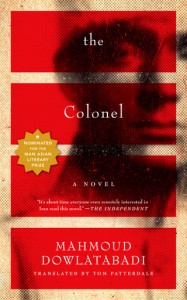October 2, 2012
Criteria for banned books in Iran
by Claire Kelley
 This week is the 30th anniversary of ALA’s Banned Books week, which is dedicated to ensuring the “availability of all viewpoints to all who wish to read them.” Our own Melville House list of banned books includes The Colonel, by celebrated Iranian writer Mahmoud Dowlatabadi.
This week is the 30th anniversary of ALA’s Banned Books week, which is dedicated to ensuring the “availability of all viewpoints to all who wish to read them.” Our own Melville House list of banned books includes The Colonel, by celebrated Iranian writer Mahmoud Dowlatabadi.
This new novel is banned in Iran, which is a place — as one blogger has pointed out — where every week is banned books week. The ministry of culture and the Ayatollah Ali Khamenei censor and restrict acess to books that they consider to be as “harmful” as “poisonous drugs.”
Since the Islamic Revolution in 1979, the country’s constitution has technically allowed for freedom of expression in article 24: “the press is free to express their opinion, unless it is against the foundation of Islam or rights of the people, and the law will explain the details.” But even so, The Guardian has published articles about the crackdown on literature in the past couple years, explaining the process that writers and publishers must go through:
Although Iran’s constitution prohibits censorship, publishers are required to submit all books to the cultural ministry where they are usually checked by three separate people charged with censoring words and phrases or labelling them as “inappropriate” for publication.
These words include: swear, tattoo, cage, makeup, wine, drunk, pork, dance, rape, dog, meditation. Homosexuality and any mention of “human touch between … fictional characters who are not married” are removed or changed by censors. It’s not just political themes that offend the censors, it might even be the style or tone of the book:
According to Homayoun, in review of a poetry book, a censor commented that it lacked appropriate rhythm. With regard to a book by Gholam-Hossein Saedi, the censor said it contained sexually-provocative material and was too ambiguous and allegorical. In review of a book written by celebrated writer Mahmoud Dolatabadi, a censor said that it was too depressing.
Other books that have been banned in Iran — one bookseller received a list of 200 — include:
- Plato’s Symposium
- Louis-Ferdinand Céline’s Journey to the End of the Night
- Ulysses by James Joyce
- Memories of My Melancholy Whores by Gabriel García Márquez
- The Zahir by Paulo Coelho
Claire Kelley is the Director of Library and Academic Marketing at Melville House.